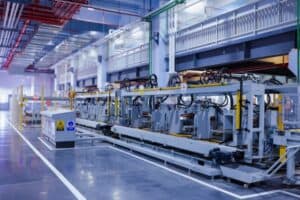Business
How Advanced Machinery Is Transforming Modern Industries
The industrial world is no stranger to change, but the pace of transformation today is unlike anything seen before. Advanced machinery, powered by breakthroughs in engineering and digital innovation, is reshaping industries in ways that go far beyond simple efficiency. These technologies are influencing creativity, redefining workforce roles, and setting new standards for global competitiveness.
Redefining the Capabilities of Design
One of the most exciting impacts of advanced machinery lies in its ability to expand design possibilities. In the past, designers and engineers were limited by what traditional tools could achieve. Today, machines equipped with advanced software integration can execute designs that were once considered unattainable. From architectural elements with complex geometries to lightweight automotive components that maximize performance, machinery is becoming a creative partner rather than just a tool for execution.
This shift means industries are no longer constrained by physical limitations. Instead, the only true boundaries are imagination and innovation, with machinery acting as the bridge that turns ambitious ideas into tangible outcomes.
Shortening the Path from Prototype to Production
Speed has always been crucial in industry, but advanced machinery is now changing what “fast” means in the context of product development. Modern equipment allows prototypes to be built, tested, and refined in record time, giving companies the ability to move from concept to finished product far quicker than before.
This acceleration is not just about saving time; it also reduces costs and helps businesses stay ahead of competitors. By streamlining the development cycle, industries can respond more effectively to evolving market needs, bringing new products to consumers faster without sacrificing quality.
Global Collaboration Through Technology
Advanced machinery is also enabling industries to collaborate in ways that were once unthinkable. Machines connected through cloud platforms and digital networks allow design and production teams to work together across continents in real time. A component can be designed in one country, optimized in another, and manufactured somewhere else entirely, all within a seamless digital workflow.
This interconnectedness has opened up global opportunities for businesses, helping them access talent, resources, and markets far beyond their immediate location. It also makes industries more resilient, as work can be shifted dynamically across facilities and regions when challenges arise.
Elevating Workforce Roles
While discussions about automation often focus on the fear of job loss, advanced machinery is actually creating new opportunities for workers. Instead of performing repetitive or physically demanding tasks, employees are stepping into more strategic roles that require problem-solving, oversight, and creativity.
Training and reskilling have become central to this shift. Operators now engage with advanced interfaces, interpret data, and oversee systems that require both technical knowledge and human judgment. This elevation of roles is fostering a workforce that is more skilled, adaptable, and capable of guiding industries into the future.
Unlocking Greater Versatility
Another defining trait of advanced machinery is its versatility. Unlike traditional machines designed for a narrow set of tasks, modern equipment can often adapt to multiple applications. For example, a CNC laser machine can shift between detailed engraving, cutting, or marking, giving businesses flexibility without the need for entirely separate systems.
This versatility reduces investment risks, as one machine can serve a variety of purposes, and also helps companies quickly pivot to meet changing consumer demands. The ability to adapt machinery to diverse needs makes it an indispensable asset in industries where agility is as important as precision.
A Future Built on Innovation
The ongoing evolution of advanced machinery points to a future where industries are defined by adaptability, creativity, and global reach. These technologies are not simply tools for greater productivity; they are enablers of entirely new ways of working, producing, and connecting.
As industries continue to embrace these innovations, the line between imagination and reality will grow ever thinner. Advanced machinery is no longer just shaping the present; it is actively building the foundation for the industries of tomorrow.






